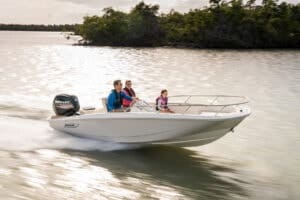You have made the decision to purchase a boat and are absolutely thrilled! Your dreams of spending lazy Sundays out on the water with your family and friends are about to become a reality. No laptop, no work calls, and no stress…well at least for the day! Boating life looks good on you. But before you get too excited, there are some things to consider, like where to store your boat. A boat is a big investment and you want to protect it and keep it in good condition.
Where to store your boat will depend on the type of boat you have, its size, where you live, the climate in the area, how often you use the boat, and the available storage options in the vicinity.
If you haven’t purchased your boat yet, you will need a boat loan. Reach out to Trident Funding for friendly and professional service, nearly 30 years of marine financing experience, and relationships with dozens of boat lenders. You can check out our free boat loan calculator to see how much boat you can afford and then apply online in just a few minutes.
Where to Store Your Boat: Boat Storage Options
Let’s dive right into some of the different options for where to store your boat. Things to keep in mind when deciding where to keep a boat include the price, the type of facility, the facility’s hours, convenience, protection from the elements, and proximity to the water. The main types of storage options include dry indoor storage, dry outdoor storage, and wet storage.
Dry Indoor Boat Storage
When storage is referred to as dry, it just means that your boat is not stored in the water. Instead, it’s stored on land, on a boat lift, or in a boat storage facility. Dry indoor boat storage specifically means that the boat will be kept away from the elements. It’s usually the most expensive storage option and facilities are often set up as boatels or as dry stack facilities.
Your boat may sit on a rack that holds boats vertically, similar to parking lots in places like New York City, that to save space, stack cars vertically. When you want to use your boat, you usually call in advance and a giant forklift will retrieve the boat and place it in the water for you. These places are rarely open 24/7 so you will need to adhere to their hours.
Pros and Cons of Dry Indoor Boat Storage
The pros include:
- Protection from the elements such as hurricanes and freezing temperatures
- Knowing your boat is safe and won’t float away
- Less maintenance and cleaning is needed because your boat is kept indoors
Cons include:
- May need to call ahead to retrieve your boat
- Often lacking the sense of community that an outdoor marina and wet storage has
- Can only get your boat out when the facility is open
- This can be an expensive option and boats over a certain size may not be permitted
Dry Outdoor Boat Storage
Storing your boat outdoors but not in the water is another option. You may choose to keep your boat on a trailer in your yard or in a parking space. Or you may choose to store your boat in a boat yard. Your boat may sit on a boat rack or it may sit on its trailer. This depends on the type of facility and the size of your boat.
This type of storage option is cheaper than indoor storage but it doesn’t offer the same protection from bad weather. You also want to make sure there are security features in place so your boat can’t be easily stolen or vandalized.
Pros and Cons of Dry Outdoor Boat Storage
Pros include:
- More affordable option
- Boat stored on a trailer is ready to hitch up to your car and get in the water
- You may be able to keep the boat on your property
Cons include:
- Boat isn’t protected against bad weather, fire, or vandalism
- Security risk if the area is easily accessible and your boat is only hooked up to a trailer
- The facility may only operate during certain hours which restricts the times you can use your boat
Wet Boat Storage
Wet boat storage means that your boat is being stored on the water. This may be at a private dock or at a marina. Your boat may be tied up, anchored, or have its own docking space often referred to as a boat slip. Wet boat storage usually allows you easy access to your boat and access to the marina’s amenities as well. There may be showers, water hookups, power hookups for your boat, stores, and cafes onsite, as well as fueling stations. Some fancy marinas also have club rooms and fine dining establishments. You get to experience the boating community by using wet boat storage but your boat isn’t protected from the elements.
Depending on the size of your boat, it may need to be lifted up to clean it, or you may need to pay a professional diver to clean the hull. A marina is fully staffed and can usually offer referrals for boat cleaners, towing services, and mechanics.
Pros and Cons of Wet Boat Storage
Pros include:
- Access to marina amenities
- More flexible boating hours
- Boating community onsite
- Boat is already in the water and ready to go
Cons include:
- Marinas with lots of amenities can be pricey
- You can’t keep your boat in the water year round in colder climates
- Boats aren’t protected from the elements
- Wet storage facility may not be located in a place convenient to where you like to take out your boat
The Wrap Up: Where to Store Your Boat
Now you know more about where to store your boat, where to store your boat cheap, and the different ways of storing boats, it’s time to decide how you want to store yours. Whether you own a large yacht and keep it in the water at a fancy marina or you own a small fishing vessel that you store in your garage, it’s important to keep your boat protected from the elements as much as possible. Each time you put your boat away after you use it, remember to inspect it for damage, clean the inside and outside and make sure it’s secure.
When you calculate the costs of owning a boat, storage is one of the major ongoing costs. Call around and price shop different storage options and know what’s included with the price. Sometimes the cheapest way to store a boat isn’t always the best way. You want the boat to last as long as possible, be seaworthy, and be kept away from harsh weather conditions.
Check out the free online boat loan calculator to calculate your monthly boat loan costs and then add the storage and insurance costs on to that number to get an estimate of how much it will cost you to own a boat each month.
Frequently Asked Questions: Where to Keep a Boat
How Much Does it Cost to Store a Boat?
The costs of storing boats varies based on a number of factors. The size of your boat will affect the cost, as will whether the storage is inside or outside, and what other amenities and utilities are included with the storage; things such as water hookups and power usage, as well as access to storage and bathrooms.
Other things that may affect the cost of boat storage options include how the boat will be retrieved, the hours of the facility, and the time of year, as well as supply and demand in that location. If you’re storing your boat somewhere that is only busy during the summers, expect to pay more during those peak seasons.
Expect to pay about $20 to $50 per foot for outdoor storage and between $50 and $200 per foot for indoor storage. For example, if you have a 50-foot boat, you will pay between $1,000 and $2,500 for indoor storage. For outdoor storage, you will pay between $2,500 and $4,000. Some facilities charge per month and others charge per season. Be sure to know upfront exactly how much time you’re paying for and the hours of the facility.
Can You Store a Boat in a Storage Unit?
The answer to can you store a boat in a storage unit is it depends. You will need to check with the storage unit management to see if storing boats is allowed. You will also need to see if there is space to accommodate your boat and trailer. You will need to be able to drive right up to the storage unit to hook your vehicle up to the trailer.
There are a lot of variables to consider if storing your boat in a storage unit. Consider things like if you have access to the unit 24/7, what the security situation is like, how far is the storage unit from the water, and will you be able to hook the trailer up to your vehicle by yourself. You may also need to provide certain documentation if you store your boat in a storage unit. The company may require the proof of boat ownership, its registration information, and your valid identification.
Although a storage unit may work, there are usually better boat storage options that are specifically meant for boats and have things like water, power, ice, and knowledgeable staff.
Can You Store a Boat at Home?
If you’re fortunate enough to live on the water and have access to a dock, then the best place to store your boat is at home. You will have access to your boat at all times, can check on it during storms, and can get it repaired right at home. This is the most convenient option. However, if you don’t live on the water or don’t have a dock, you may consider storing your boat on your property.
Keep in mind that if you live in a homeowner’s association, there may be rules preventing this. You can also consider keeping your boat in your garage or shed if it fits. Of course, if you own a yacht or a large cabin cruiser, you will need to store your boat at a marina because it won’t fit in a garage.





